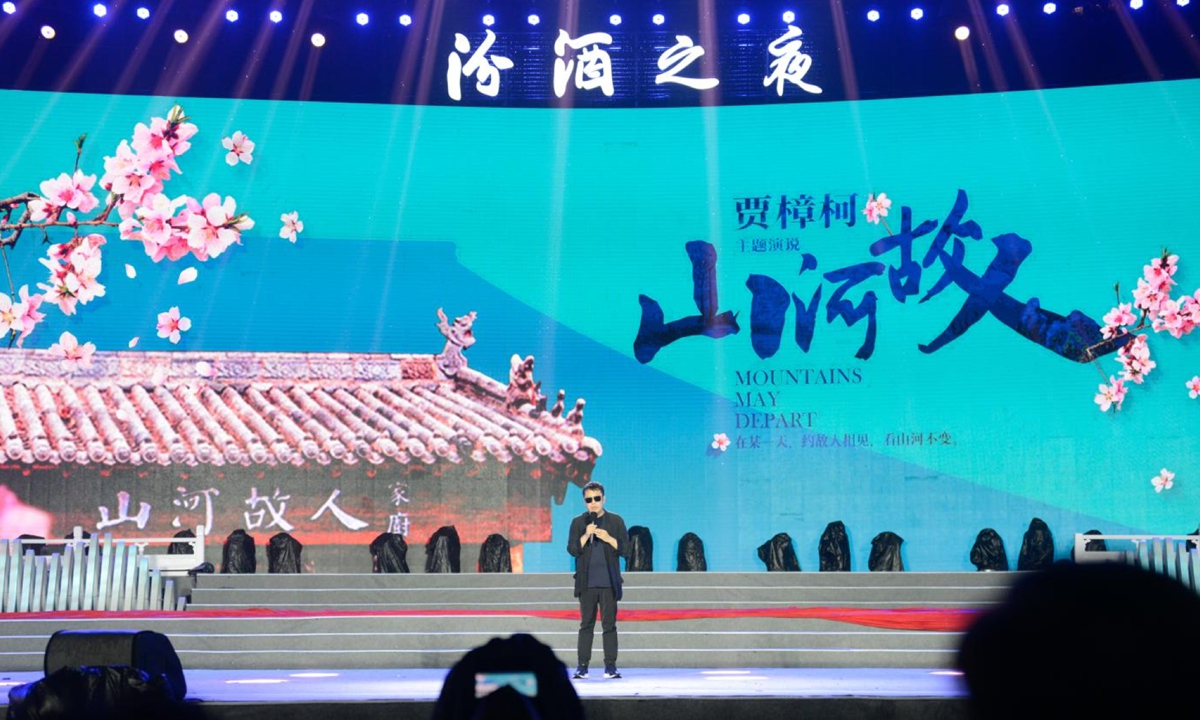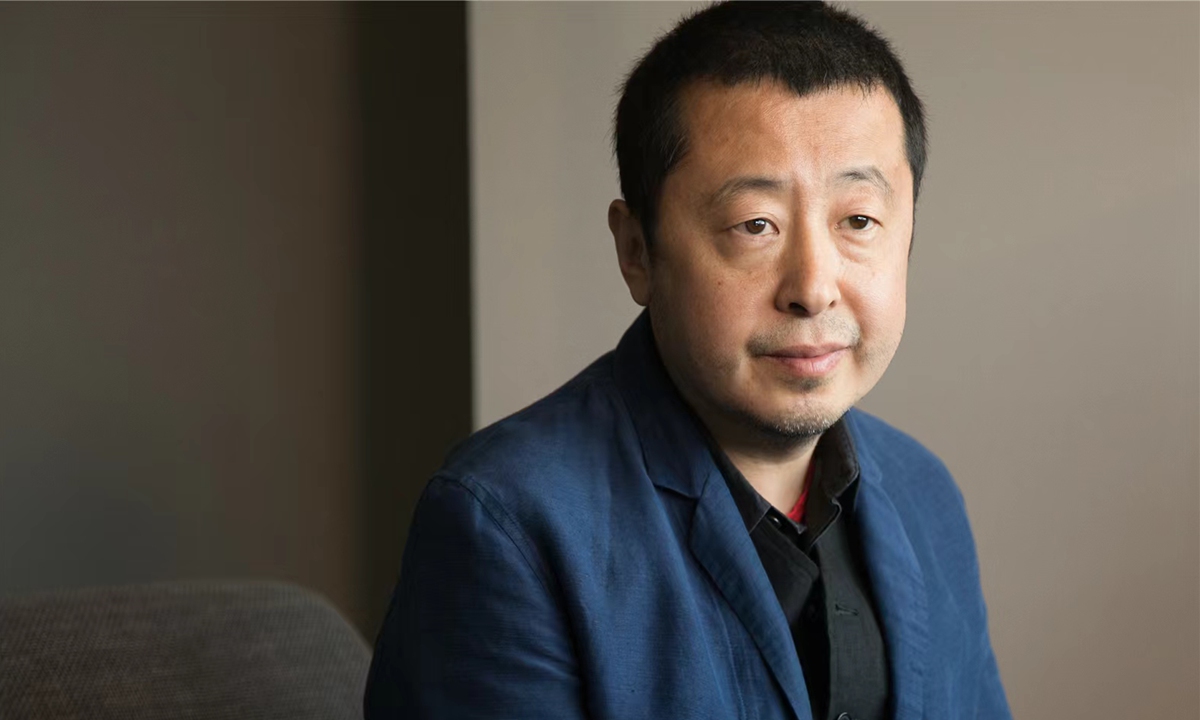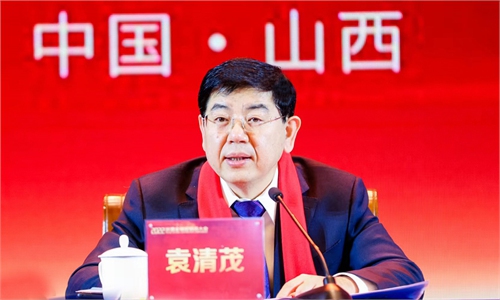SOURCE / PRESS RELEASE
Fenjiu: An aroma that has spread from a single town to the world

Chinese director Jia Zhangke speaks at the "Fenjiu Night" 2022 China Xinghuacun International Baijiu Expo Photo: Courtesy of Fenjiu
The "Fenjiu Night" 2022 China Xinghuacun International Baijiu Expo is being held in Fenyang, North China's Shanxi Province. The city is not only famous for producing Fenjiu liquor, it is also the hometown of Chinese director Jia Zhangke, who told the story of his relationship with Shanxi, Fenyang and Fenjiu in his 2015 film Mountains May Depart.
Nourished by the land of Fenyang, Jia, who also attended the expo, has repeatedly constructed an image of his hometown for the audience through the scenery, emotions and quiet and unobtrusive narrative style in his films. From Fenyang to the world, he has also always believed that his hometown is the world and the world is his hometown.
Traveling all over the world, Jia always keeps Fenjiu made in his hometown of Fenyang with him, just like carrying the clay of his hometown. Some people say that Jia is the one who introduced Fenjiu to the world, but Jia emphasizes that "I didn't bring Fenjiu to the world, I just followed Fenjiu's footsteps to the world."
Global thinking
Endless mountains, large cornfields and the Wen Feng Pagoda are located in Fenyang. Born in 1970 in the small county of Lüliang in Shanxi Province, Jia has a deep connection with his hometown.
Mountains May Depart, Xiao Wu, Platform - almost all of Jia's works fall under the shadow of his hometown. He has used these works over the years to show audiences the "Fenyang world" that exists in his memory, telling a clear logic: "This is Fenyang, this is Shanxi, this is the whole world."
In his essay "My Border City, My Country," Jia also wrote, "Every time I hold a pen and face the blank page, my thoughts will inevitably return to my hometown, the distant Fenyang." He spares no effort to use his "hometown elements" to express his "global thinking."

Chinese director Jia Zhangke Photo: Courtesy of Fenjiu
6,000-year-old rootsFenyang is famous for the Fenjiu liquor produced by Xinghuacun, which has 6,000 years of brewing history, 1,500 years of fame and 800 years of distillation history. In ancient times, Fenjiu is a famous baijiu listed in the Twenty-Four Histories. Fenjiu is the pride of Fenyang people.
Talking about Fenjiu, Jia exclaimed that "every time I pass by Xinghuacun, I can smell the aroma of baijiu all over the village. For me, this aroma is not only modern, but also ancient, it slowly floats to every Shanxi native from a distant 6,000 years ago."
As a Fenyang local, Jia has deep feelings for Fenjiu.
"As a Fenyang native, I have been exposed to Fenjiu since I was a child. It is almost the spiritual totem of us Shanxi people. When I was a kid in the 1970s, every family would have two bottles of Fenjiu to share with friends and relatives on festive days and important occasions," he said.
The aroma of Fenjiu, which drifted through the air throughout Jia's childhood, reappears in his later films, becoming a kind of symbol of sentiment and trust. In the film Still Life, the main character travels thousands of kilometers in search of his relatives. He has only one gift in his simple bag - two bottles of Fenjiu. In the film Mountains May Depart, the hero is living in Australia, and when he is homesick, he takes out the bottle of Fenjiu he keeps in his Australian residence.
Jia said that for Shanxi people, Fenjiu has transcended profession and age to become an attitude. When visiting friends and relatives, sitting down together for a glass of Fenjiu is an important catalyst for communicating one's feelings.
This is the reason why Jia is able to so successfully depict this emotional connection in his films.
In life, Jia also loves to drink Fenjiu.
"Our crew has a rule that the producer must always bring a case of Fenjiu as part of preparations for the last shot. Once done, we all have a drink together."
In Jia's opinion, Fenjiu belongs to the future, and more importantly, to the world. The frequent "appearances" of Fenjiu in Jia's films made some audiences comment that it was Jia who brought Fenjiu to the world stage, however, Jia has emphasized many times that he followed the footsteps of Fenjiu to reach the world stage.
Fenjiu has traveled all over the world, carried by Shanxi people and Jin merchants - another name for Shanxi merchants. It belongs not only to its hometown, but also the world.
"When I had the opportunity to travel around the world, I found that I could see Fenjiu in supermarkets in Berlin, and Zhuyeqing tea in supermarkets in Paris," he said.
In 1915, Fenjiu was the only Chinese baijiu to win the Grand Prix A medal at the The Panama-Pacific International Exposition in San Francisco, California.
But according to Jia, Fenjiu is much more than that: Behind that honor is a legacy that has been passed down from generation to generation.


